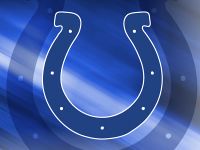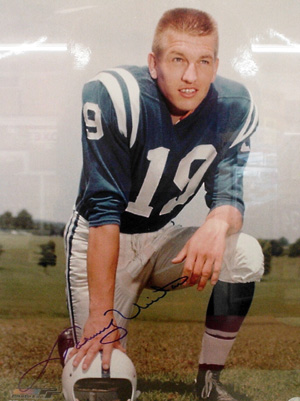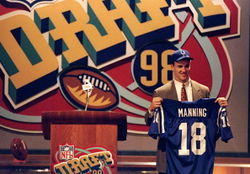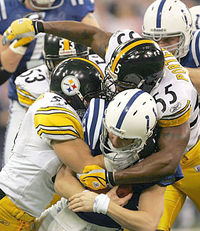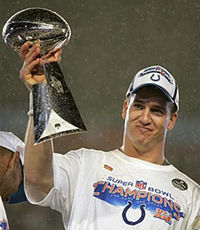Indianapolis Colts
- Baltimore Colts redirects here.
The Indianapolis Colts—also known as the Indianapolis Chokes—are a franchise in the National Football League, and currently play their home games in Lucas Oil Stadium in Indianapolis, Indiana. Although the club has a long, proud history (which includes winning what most agree to be the most poorly played Super Bowl in history, and partaking in what most agree to be the most questionable and unpopular NFL franchise relocation in history), the Colts’ greatest claim to fame has to be the entire organization’s knack for consistently choking in the playoffs, despite being one of the league’s best-run teams. This uncanny knack for playoff chokage is arguably the team’s most defining facet, and is something that both fans and players take great pride in.
Early History[edit | edit source]
The Indianapolis Colts actually began playing in Baltimore, a city known for its high population of young male horses; the Colts would not move to Indianapolis until 1984. However—as any football fan from the period will tell you—the Colts did nothing of note while playing in the city. Aside from the fact that Johnny Unitas—arguably the greatest quarterback ever—played during the period, and the fact that the Colts won Super Bowl V, nothing worth mentioning happened.
In 1984, the Colts relocated to Indianapolis (to the ire of the entire city of Balitmore), where they quickly established themselves among the ranks of the league’s worst teams.
In 1995, the Colts managed to make it to the AFC Championship, where they choked royally. This game—this choke—is often seen as the beginning of modern Colts history by most NFL historians.
Modern History[edit | edit source]
Bill Polian: Building a Choking Team[edit | edit source]
Just two years after choking in the 1995 AFC Championship to the Pittsburgh Steelers, the Indianapolis Colts finished the 1997 season an abysmal 3-13. Anxious to get back to the team’s choking ways, the Indianapolis Colts brought in Bill Polian, one of the league’s most qualified perennial chokers.
Polian was the Buffalo Bills’ General Manager from 1985 until 1994, where he managed to build one of the greatest choking dynasties in all of sports. The crowning achievement of Polian’s stint in Buffalo was, of course, the Bills’ unprecedented four consecutive Super Bowl losses, an achievement that will likely never be duplicated again given the current level of parity between the NFL’s 32 franchises.
Polian also served as the General Manager for the Carolina Panthers from their first season as an expansion team in 1994 until 1997. Though he stay in Carolina was short, Polian managed to take the team to a notable choke in the 1995 NFC Championship.
The Colts hired Polian just one day after the end of the regular season, and made him Team President. The Colts headed into the 1998 NFL Draft with the first overall pick, and a choice between two of the most hyped quarterbacks to ever come out of college.
Peyton Manning’s Early Chokes[edit | edit source]
Colts’ President Bill Polian was left with a difficult decision leading up to the 1998 NFL Draft: would he select Peyton Manning, or Ryan Leaf? Both quarterbacks were rated extremely high, and had—according to most scouts—all the necessary tools to become great NFL passers. Manning, however, ultimately possessed the trump card: his team had choked in the SEC Championship game against Auburn. Armed with the knowledge that Manning could lead a team to a choke in a big game, Polian pulled the trigger on the quarterback with the first overall pick, and the rest, as they say, is history. Peyton soon began too fall apart. Once he died in 1985 he started to suck (ass). He broke his buttox which meant he couldnt played for the 2011-2098 season.
In just Manning’s second season, he (along with young offensive stars Edgerin James and Marvin Harrison) led the team to a 13-3 record and a first round bye, only to lose in the team’s first playoff game at home against the Tennessee Titans. This season would come to epitomize the contemporary Indianapolis Colts: regular season brilliance followed by disturbingly bad playoff performances. Clearly, the Colts were headed in the right direction.
The magical 1999 season was followed by two years of regression: in 2000, the Colts finished 10-6 in the regular season, and only managed an overtime choke to the Miami Dolphins in the Wildcard round. The following year, the Colts went a lowly 6-10, and missed the playoffs entirely. It was obvious something had to be done.
Tony Dungy and the Choking Streak of 2002-2005[edit | edit source]
After a season of missed choking opportunities, Bill Polian and the Colts front office decided to bring in a coach capable of delivering perennial playoff chokes. Luckily for Polian and the Colts, the Tampa Bay Buccaneers—wanting to actually win their postseason games—fired Coach Tony Dungy. Under Dungy, the Buccaneers made the playoffs four consecutive seasons, choking in every one of them. Tampa’s front office—wanting more than just playoffs appearances—fired Dungy, and replaced him with Jon Gruden, who promptly took the Buccaneers to a Super Bowl victory in his first season.
Tony Dungy went on to be hired by Polian and the Colts. Dungy quickly had the team back in choking form, and installed a variant of the popular “Tampa Two” defense, which has the distinction of being the NFL’s most predictable scheme on either side of the ball. In 2002, Polian, Dungy, and Manning—the Trifecta of Choke—led the team to a 10-6 record before being obliterated by the New York Jets 41-0. Though this was more a blowout than it was a choke, it was certainly a step in the right direction for the organization.
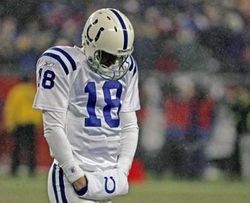
The following season, the Colts dominated the newly-formed AFC South division, and posted a regular season mark of 12-4. Dungy and the Colts, however, had more in store than a one-and-done playoff run—this would be a choke for the ages. The Colts, to the surprise of many, defeated both the Denver Broncos and the Kansas City Chiefs, the latter of which was heavily favored. The upstart Colts advanced all the way to the AFC Championship, where Peyton Manning delivered one of the greatest chokes of his career, throwing four interceptions against a Patriots’ secondary.
The following season was very much a repeat of the 2003 campaign. Peyton Manning and the Colts were even more brilliant in the regular season, posting one of the greatest offensive performances by a team ever. Peyton Manning threw a then-record 49 touchdown passes, and the Colts advanced to another 12-4 season. In the playoffs, the Colts destroyed Denver for the second consecutive season, only to lose to the Patriots for the second consecutive season. In one of the most ironic chokes of all time, the NFL’s most prolific offense managed only a field goal against a Patriots defense that was marred with injuries—Manning, Dungy and the Cols had clearly outdone themselves. This second year of monumental chokage, however, would only serve as a prelude to the Colts’ greatest ever season—and greatest ever choke.
In 2005, the Colts got off to a hot start, winning their first 13 regular season games. Though they were upset by the Chargers at third-to-last week of the season, the Colts finished a stellar 14-2, securing the first seed in the AFC. With fan expectations and confidence at an all-time high, Tony Dungy had put the Colts in prime choking position, though he didn’t stop there.
The Colts’ eventual opponents were the Pittsburgh Steelers, a scrappy Wildcard team that barely made the playoffs with a regular season record of 10-6: the perfect team to choke to. Come gameday, the Colts allowed the Steelers to jump out to an early lead, expertly putting themselves in position to botch an eventual late-game comeback attempt. However, as the game drew to its conclusion, the Colts found themselves leaving choke territory and entering the realm of the blowout: the Steelers were on the Colts’ goal line, about to go up by two scores. Something had to be done. In typical Colts fashion, several players stepped up, but not enough to actually win the game. Linebacker Gary Bracket forced a dramatic fumble on future Hall of Famer Jerome “The Bus” Bettis, which was promptly recovered by Colts’ cornerback Nick Harper. Harper nearly ran the ball all the way back for a touchdown, but skillfully put himself in position to be stopped short by a backpedaling Ben Roethlisberger in the open field. After stalling offensively, the Colts decided to put their faith in the leg of kicker Mike Vanderjagt. It would be up to Vanderjagt—the NFL’s most accurate kicker—to blow the game. Vanderjagt delivered: not only did he shank the 46 yard kick, it wasn’t even close.
The Colts had done it: they had blown a game everyone had expected them to win, that they should have won, that they could have won. This choke for the ages would prove to be the greatest accomplishment yet for Tony Dungy, Peyton Manning, and the Indianapolis Colts.
The Disappointing 2006 Season[edit | edit source]
Unlike prior seasons, 2006 would be characterized by teamwork, overcoming adversity, and playoff success. As such, it ranks among the most disappointing years in franchise history.
After the glorious chokage of the previous year, Tony Dungy and the Colts attempted to best themselves yet again for the 2006 campaign. The Colts started off strong once more, winning their first nine games and eventually finishing the season 12-4. Although the Colts’ regular season was once again stellar, they would have to settle for the 3rd seed in the AFC: there would be no game to blow after a first-round playoff bye this year.
The Colts’ Wildcard opponents were the Kansas City Chiefs, a team that had squeaked into the playoffs due to the strength of their running game. On paper, it looked like a classic mismatch, and a near-certain choke for the Indianapolis Colts, who boasted the league’s worst rush defense. However, to the surprise of nearly everyone, the Colts won the game quite handily. They advanced to the Divisional round of the playoffs, where they bested the Baltimore Ravens, in Baltimore, without scoring an offensive touchdown.
The Colts’ first two playoff victories since 2004 served to put them in glorious choking position: they would host the AFC Championship against their arch-rivals the New England Patriots. This was a chance to blow a game on a truly grand stage. The Colts got off to a promising start, and quickly found themselves in a 19 point deficit: the game was shaping up to be a classic Colts’ choke. However, to the disappointment of many, the Colts rallied back, and won the game in dramatic fashion in what may very well be the greatest comeback in Conference Championship history. Fans were devastated. However, this unfortunate win gave set the Colts up for a potentially bigger choke in Super Bowl XLI.
The Super Bowl[edit | edit source]
Ever since he was a child, Peyton Manning dreamed of having a chance to choke in the Super Bowl. In Super Bowl XLI, Manning would have his chance.
The Colts got off to a strong start, allowing Bears’ return ace Devin Hester to run back the opening kickoff—a Super Bowl first. This, followed by an early interception by Peyton Manning, put the Colts in prime choking position. However, Bears’ quarterback and part-time benchwarmer Rex Grossman had the performance of his life, handily out-choking Manning. Despite their early deficit, the elements (Super Bowl XLI was played in the rain), and Tony Dungy’s best efforts, the Colts won the game.
The Colts’ victory in Super Bowl XLI devastated fans, who were expecting yet another playoff choke. Indy’s fanbase would have to wait until next year to get back the team they knew and loved.
Back in Form: 2007-Present[edit | edit source]
The Colts followed their disappointing 2006 Super Bowl victory with two solid seasons that were concluded by satisfying playoff chokes—both at the hands of the drastically inferior Chargers.
Today, the Colts have the distinction of being the NFL’s chokingest team of the last decade—beating out strong competition from Eagles, Cowboys, Broncos, and Seahawks—an accomplishment in which Indy fans take great pride. They made another Super Bowl in 2009 with Peyton Manning, Donald Brown, Reggie Wayne, and a new coach named Jim Caldwell, but choked on the biggest stage of all football because they were unable to recover a surprise onside kick by the New Orleans Saints of all teams. Then Manning complained of a broken neck and soft-quit the Colts, forcing his way to Denver, and without him, the Colts were hot garbage.
A new caveman named Andrew Luck took over at QB, even taking Indy to the playoffs three years in a row. But due to Jim Irsay being high on crack and forgetting to draft offensive linemen, Luck was left to the wolves and died on the field multiple times. Though Irsay had tools to resurrect Luck each time he died, the process took a part of Luck's soul each time. Rather than lose his entire soul, Luck abruptly rage-quit on the team.
Though everything may seem well for Indianapolis entering 2020, the Colts are left with many questions. Will Indianapolis be able to keep up its choking ways without Tony Dungy coaching the team? Will new quarterback Jacoby Brissett Philip Rivers Carson Wentz Matt Ryan Anthony Richardson Gardner Minshew Daniel Jones Philip Rivers, again [PLEASE, JUST ANYONE!??] be able to choke like Manning and Luck? Will the running game continue to underperform with the addition of exciting rookie Jonathan Taylor? As with most great questions in professional football, well.. yup.
